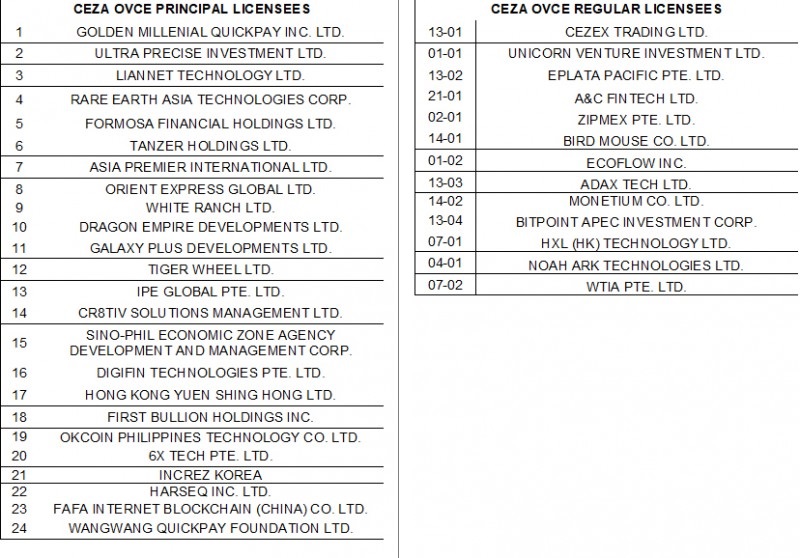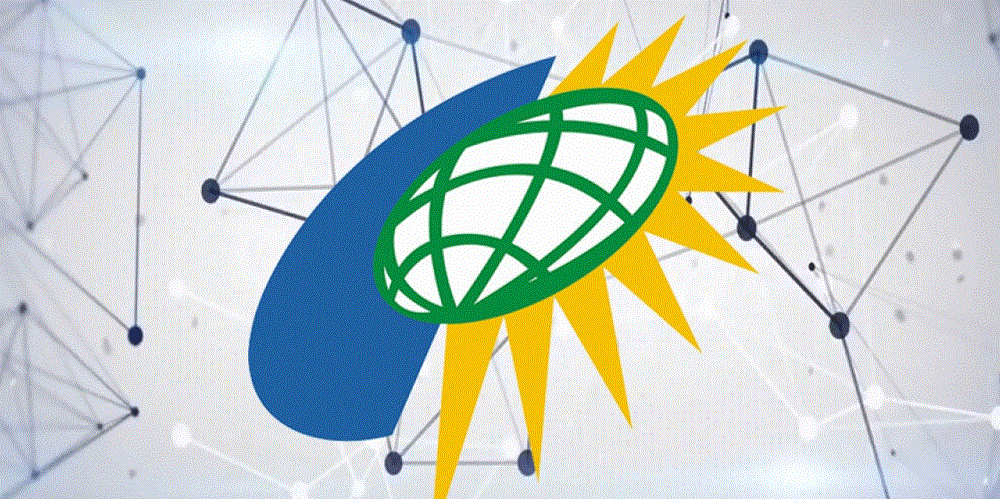Latest news about Bitcoin and all cryptocurrencies. Your daily crypto news habit.

The number of approved cryptocurrency exchanges has been growing in the Philippines. In addition to 11 operators registered by the central bank, the Bangko Sentral ng Pilipinas, there are 37 other crypto exchange operators licensed by the government-owned Cagayan Economic Zone Authority.
Also read: FATF Releases Global Standards for Crypto Assets
11 Crypto Exchanges Registered With Central Bank
The Bangko Sentral ng Pilipinas (BSP) has registered 11 cryptocurrency exchanges, allowing them to operate in the country, according to the most recent list of Remittance and Transfer Companies with Money Changing or Foreign Exchange Dealing and Virtual Currency (VC) Exchange Service.
The licensees are Betur Inc. dba Coins.ph, Rebittance Inc., Bloomsolutions Inc., Virtual Currency Philippines Inc., Etranss Remittance International Corp., Fyntegrate Inc., Zybi Tech Inc., Bexpress Inc., Coinville Phils Inc., Aba Global Philippines Inc., and Bitan Moneytech Co. Ltd.
The central bank adopted a formal regulatory approach to cryptocurrency through the issuance of Circular No. 944 dated Feb. 7, 2017. It requires businesses engaged in the exchange of cryptocurrencies for fiat money in the Philippines to register with the central bank as remittance and transfer companies. The bank elaborated:
BSP-registered VC exchanges are now required to put in place adequate safeguards to address the risks associated with VCs such as basic controls on anti-money laundering and terrorist financing, technology risk management and consumer protection.
As for cryptocurrency ATMs, the central bank revealed on June 13 that it had not authorized any individual or entity to install them in any location in the Philippines or manage online platforms for them and other crypto transactions. The notice reiterates that crypto ATM operators must register with the central bank as VC exchanges under the aforementioned circular. In addition, the BSP noted that a separate approval may be required from the Securities and Exchange Commission for the issuance of initial coin offerings and operation of crypto trading platforms.
37 Others Licensed by CEZA
Besides the companies registered by the BSP, many others have been licensed by the Cagayan Economic Zone Authority (CEZA) to operate crypto exchanges. CEZA is a government-owned and controlled corporation tasked to manage and supervise the development of the Cagayan Special Economic Zone and Freeport, the 54,119-hectare area located at the northeastern tip of the country.
“As a freeport, it operates as a separate customs territory similar to Hong Kong, Singapore, Labuan in Malaysia and Hamburg in Germany,” CEZA described, adding that it has been offering foreign companies incentives and advantages to registering their businesses there. “These developments are all deemed toward attracting legitimate and productive local and foreign investments and, thus, creating employment opportunities in and around the freeport,” its website details. CEZA Administrator and CEO Raul L. Lambino explained:
We are making CEZA a sandbox for the development of these disruptive technologies, serving as a laboratory for interested parties to experiment on these new dimensions of business enterprise.
On June 17, CEZA revealed that 37 companies are currently licensed under its “Financial Technology Solutions and Offshore Virtual Currency Exchange (OVCE) Business Rules and Regulations of 2018.” There are two types of licenses. Twenty-four companies have been granted the OVCE Principal license and 13 companies the OVCE Regular license. The former allows licensees to conduct offshore fintech business and crypto exchange activities; the latter allows licensees to conduct only offshore crypto exchange activities.
 List of OVCE licensees provided by CEZA on June 17.
List of OVCE licensees provided by CEZA on June 17.
The 24 Principal licensees are Golden Millenial Quickpay, Ultra Precise Investment, Liannet Technology, Rare Earth Asia Technologies, Formosa Financial Holdings, Tanzer Holdings, Asia Premier International, Orient Express Global, White Ranch, Dragon Empire Developments, Galaxy Plus Developments, Tiger Wheel, Ipe Global, Cr8tiv Solutions Management, Sino-Phil Economic Zone Agency Development and Management, Digifin Technologies, Hong Kong Yuen Shing Hong, First Bullion Holdings, Okcoin Philippines Technology, 6x Tech, Increz Korea, Harseq, Fafa Internet Blockchain (China), and Wangwang Quickpay Foundation.
The 13 Regular licensees are Cezex Trading, Unicorn Venture Investment, Eplata Pacific, A&C Fintech, Zipmex, Bird Mouse, Ecoflow, Adax Tech, Monetium, Bitpoint Apec Investment, Hxl (HK) Technology, Noah Ark Technologies, and Wtia.
Some companies have falsely claimed to have been licensed such as Freedom Traders Club, Ploutos Innovation, Ploutos Coin, Hedger Technology, Hedger Mining, Idragon Science Development, Teo Consulting Group, ECP, and Grace Exchange, CEZA warned. The authority additionally clarified:
No Filipino company, Filipino, or Philippine resident is allowed to apply for a CEZA OVCE license, and if so licensed, such licensee is not allowed to sell securities to Filipinos or to exchange tokens into fiat currency, unless they are registered with the SEC or the Bangko Sentral ng Pilipinas (BSP), respectively.
Philippines Building Crypto Valley of Asia
In collaboration with property developer Northern Star Gaming and Resorts, CEZA is building Crypto Valley of Asia for companies operating in the Cagayan Special Economic Zone and Freeport.
The first phase of the project consists of a 25-shop housing development inside the cyberpark with services and amenities such as co-working and living spaces, business incubation and acceleration hubs as well as back offices of crypto exchanges and service providers, CEZA outlined, adding:
Soon to also rise in crypto valley are a world-class internet data center, crypto-mining firms, self-contained power production facilities, and a state-of-the-art cyber security and risk assessment facility.
BSP’s Regulatory Approach to Cryptocurrency
“The BSP recognizes that VC systems can revolutionize financial services delivery, particularly for payments and remittances,” Governor Nestor A. Espenilla Jr. acknowledged at the annual convention of the Association of Philippine Correspondent Bank Officers in June last year.
 BSP Governor Nestor A. Espenilla Jr.
BSP Governor Nestor A. Espenilla Jr.
Explaining the central bank’s views and regulatory approach to cryptocurrency, the governor stated that “Cryptocurrencies are a medium of exchange. The Bangko Sentral ng Pilipinas recognizes this,” noting:
We have adopted a regulatory approach to privately-issued cryptocurrency that is balanced, open and flexible… This is to allow the market to promote financial innovation and for the industry to take advantage of all its benefits and efficiencies – with prudence.
He further remarked, “Cryptocurrencies, like fiat currencies, are neither good nor bad. They are neutral … The BSP allows the market to develop but it has also issued responsive regulations to uphold consumer protection and to maintain financial stability.”
What do you think of the Philippines’ approach to regulating cryptocurrency? Let us know in the comments section below.
Images courtesy of Shutterstock, the BSP, and CEZA.
Are you feeling lucky? Visit our official Bitcoin casino where you can play BCH slots, BCH poker, and many more BCH games. Every game has a progressive Bitcoin Cash jackpot to be won!
Disclaimer
The views and opinions expressed in this article are solely those of the authors and do not reflect the views of Bitcoin Insider. Every investment and trading move involves risk - this is especially true for cryptocurrencies given their volatility. We strongly advise our readers to conduct their own research when making a decision.



